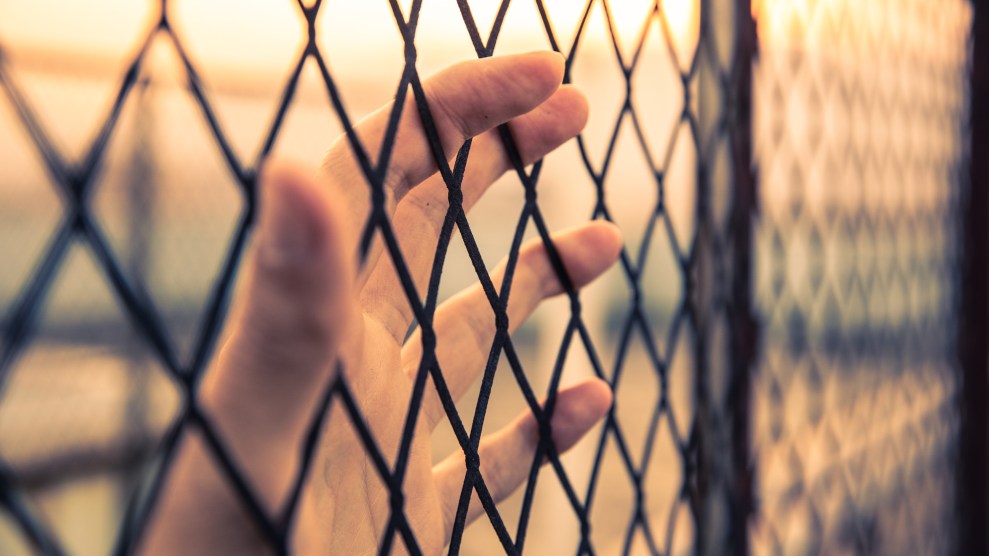
Getty/Xijian
In 2015, Kerry King was arrested in Tulsa, Oklahoma, because she failed to stop her abusive boyfriend from beating her and her young daughter.
That’s a slight simplification (read more about her case here), but in essence, prosecutors chose to blame the victim. King, then 28, tried to fight her boyfriend off when she discovered him choking her 4-year-old. But a jury said she should have done more, whatever it took, to overcome him. As a result, King got 30 years in prison, while her boyfriend, who pleaded guilty to child abuse, got 18 years—significantly less time.
If King’s punishment seems unfair, it’s certainly not out of the ordinary. Around the country, women’s prisons are filled with mothers who were arrested in the throes of domestic violence. In Oklahoma alone, as my Mother Jones colleagues and I revealed in a recent investigation, dozens of women like King are currently incarcerated under the state’s “failure to protect” law, which punishes parents who fail to stop another person—often an abusive romantic partner—from harming their kids. Other women are locked up because they fought back and killed their abusers, or because they were coerced by violent partners into committing criminal acts.
But the number of domestic violence survivors in Oklahoma prisons could soon change. In January, a Republican lawmaker in the state, Rep. Toni Hasenbeck, quietly introduced a bill that could give some of them a second chance. The Universal Defense Act is just a shell for now—Hasenbeck still needs to plug in the particulars of what it would do. But according to an attorney who has worked with her on it, Hasenbeck hopes the legislation will help courts shorten the sentences of some survivors like King, possibly allowing them to leave prison years earlier than they might otherwise. “You’re saying, ‘Look, this person was abused, and a lot of people believe they deserved more nuance in the sentencing process because of the abuse,” says the attorney, Colleen McCarty, of the nonprofit Oklahoma Appleseed Center for Law and Justice. “We’re gonna provide that.”
Once it’s fleshed out, the Oklahoma bill is expected to be somewhat similar to New York’s Domestic Violence Survivors Justice Act, a landmark 2019 law that gives judges the power to shorten the prison sentences of people who can prove a link between the crime they committed and the domestic violence they experienced. The law applies to both new and old cases, theoretically helping people whether they’re going through their trials now or they’ve already spent years behind bars.
In Oklahoma, which incarcerates more women per capita than almost any other state, a change like that could have major consequences: Last year, when McCarty spoke with me about the need for such a bill, she estimated it might help about 500 women serving prison time.
But passing the legislation won’t be easy. Only a few states have similar laws, and none of them are as conservative as Oklahoma. “I’m not going to be surprised if our police unions, sheriff’s association, or district attorneys come out against it,” McCarty told me. They might ask, “Well, where do you draw the line? Many people in Oklahoma have experienced abuse. Is this gonna be a get-out-of jail-free card?”
If it passes, the bill would probably be a far cry from a free ticket out of prison. The law in New York certainly hasn’t been one. There, survivors of domestic violence must go through a multi-step application process for resentencing and prove through documentation and testimony that they were abused, providing courts with evidence like police reports and doctors’ notes. The Oklahoma bill is expected to have similar requirements, potentially excluding survivors who don’t have enough proof—something that worries some activists and attorneys. “If you’re abused, especially if you’re in a population on the margins like an undocumented person or someone who’s afraid to go to law enforcement or report to a doctor, you’re probably not going to have medical records,” McCarty told me last year. “Maybe some family member knows” and can testify, said Alan Rosenthal, a defense attorney in New York who has worked on these cases, “but lots of times, the victim of abuse is isolated from their family and community.”
Despite the hurdles, a resentencing bill could be the best shot for Kerry King and other incarcerated survivors to revisit their cases. Rep. Hasenbeck, who did not respond to requests for comment, is currently in the process of talking with other state House members to sort out more precise language for the legislation. It’s expected to be public sometime in the next few weeks, ahead of committee hearings.
Until then, King will continue to wait. “I just hope that they grow up and become successful,” she told me of her children, “and that I can get out of here and be there for them and be the mom that I always knew that I was.”













